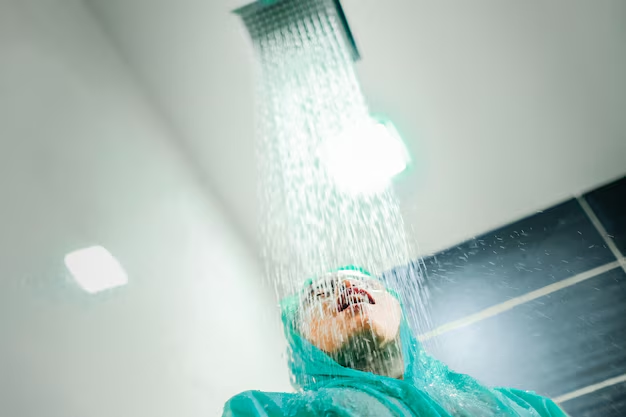Your Guide to Does Medicare Pay For Walk In Showers
What You Get:
Free Guide
Free, helpful information about Medicare Insurance and related Does Medicare Pay For Walk In Showers topics.
Helpful Information
Get clear and easy-to-understand details about Does Medicare Pay For Walk In Showers topics and resources.
Personalized Offers
Answer a few optional questions to receive offers or information related to Medicare Insurance. The survey is optional and not required to access your free guide.
Can Medicare Help Cover the Cost of Walk-In Showers?
At some point, many older adults and individuals with mobility challenges find themselves asking whether Medicare covers walk-in showers. These modern bathroom upgrades can be life-changing, offering safer and more accessible bathing options. However, the intersection of healthcare coverage and home renovations can often be murky. Let’s explore how Medicare interacts with the need for a walk-in shower and what you might do if coverage isn't available.
Understanding Medicare Coverage
Medicare is a federal health insurance program primarily for people aged 65 and over, though it also assists younger individuals with certain disabilities. It's divided into several parts: Part A (hospital insurance), Part B (medical insurance), Part C (Medicare Advantage), and Part D (prescription drug coverage).
When it comes to home modifications, like installing a walk-in shower, Medicare's coverage can be pretty limited. Typically, Medicare Part B covers “durable medical equipment” deemed medically necessary by a doctor. However, home modifications, unless extremely specific, such as the addition of grab bars deemed essential to a person's mobility, are not typically covered under traditional Medicare benefits.
Exploring Alternative Avenues
Recognizing the potential expense a walk-in shower can incur, here are some alternatives that might provide financial assistance:
1. Medicaid
Medicaid, a joint federal and state program, offers more flexibility than Medicare when it comes to home modifications. Some state Medicaid programs offer Home and Community-Based Services (HCBS) waivers, which might cover bathroom modifications, including walk-in showers, to help recipients live safely at home. The specifics can vary widely by state, so checking your state's offerings might be fruitful.
2. State and Local Programs
Many states offer Assisted Living Waivers or similar programs that could assist in financing necessary home improvements. Contacting your local Department of Aging might provide leads on subsidized services or grants for home renovations.
3. Non-Profit Organizations
Organizations such as Rebuilding Together and Habitat for Humanity often assist with necessary home modifications for low-income families or seniors. They focus on ensuring safe home environments, which could include the installation of a walk-in shower.
4. Tax Deductions
If a walk-in shower is proven medically necessary by a healthcare provider, there could be potential tax deductions available for home improvements under medical expenses. Consulting a tax advisor regarding potential deductions is always a recommended approach.
Considering Financial Products and Strategies
Where direct assistance isn't available, various financial products and strategies might ease the burden of funding such home improvements.
Personal Loans and Credit Cards
Personal loans or home equity lines of credit (HELOCs) could be alternatives, allowing you to spread the cost of the installation over a manageable period. However, always be mindful of the terms and interest rates involved.
Low-Interest Credit Cards
If eligible for low-interest or zero-interest introductory rate credit cards, this could be a temporary solution. However, ensure any balance is manageable before promotional rates expire.
The Bottom Line
Safely aging in place with the aid of home improvements like walk-in showers is a priority for many. While Medicare typically doesn't cover these costs, other programs, grants, and financial products might provide the necessary assistance. Continually exploring and leveraging available resources can help make safe and sustainable living environments a reality.
Financial Assistance & Resources 🌟
- Medicaid Waivers: State-specific programs for qualified individuals offering home modification coverage.
- Non-Profit Assistance: Organizations like Rebuilding Together and Habitat for Humanity supporting necessary renovations.
- Assisted Living Waivers: Possible state programs assisting with aging in place modifications.
- Tax Deductions: Potential medical expense deductions for necessary home improvements.
- HELOCs/Persoanl Loans: Flexible financial products to spread installation costs over time.
- State Aging Departments: Local agencies offering guidance on available assistance programs.
What You Get:
Free Medicare Insurance Guide
Free, helpful information about Does Medicare Pay For Walk In Showers and related resources.

Helpful Information
Get clear, easy-to-understand details about Does Medicare Pay For Walk In Showers topics.

Optional Personalized Offers
Answer a few optional questions to see offers or information related to Medicare Insurance. Participation is not required to get your free guide.


Discover More
- Am I Elgible For Medicare
- Am I Enrolled In Medicare
- Am I Qualified For Medicare
- Are Adult Diapers Covered By Medicare
- Are Chemotherapy Drugs Covered By Medicare Part d
- Are Colonoscopies Covered By Medicare
- Are Covid Tests Covered By Medicare
- Are Cpap Machines Covered By Medicare
- Are Cpap Supplies Covered By Medicare
- Are Dental Implants Covered By Medicare
